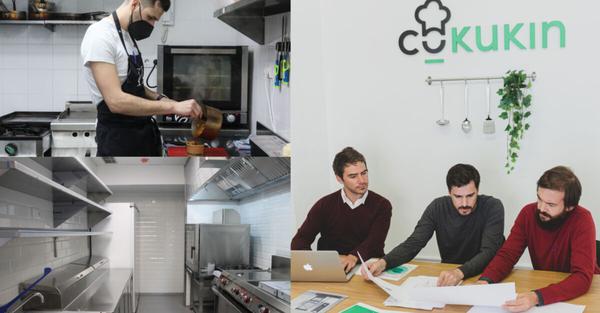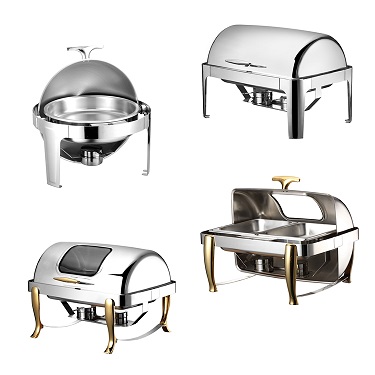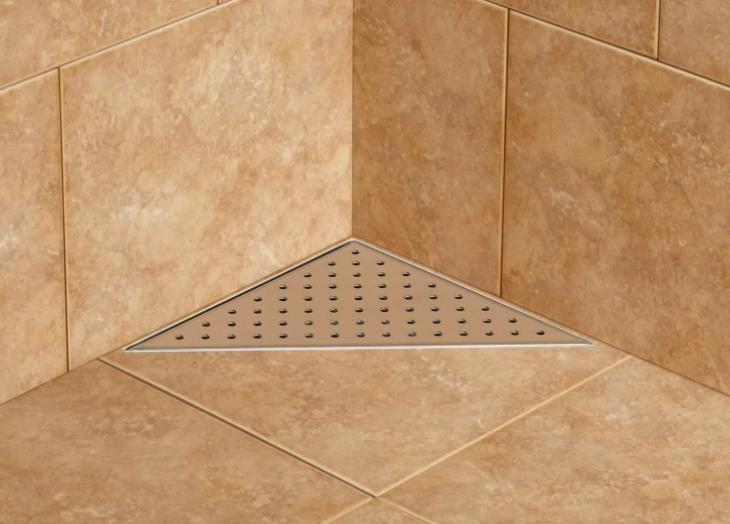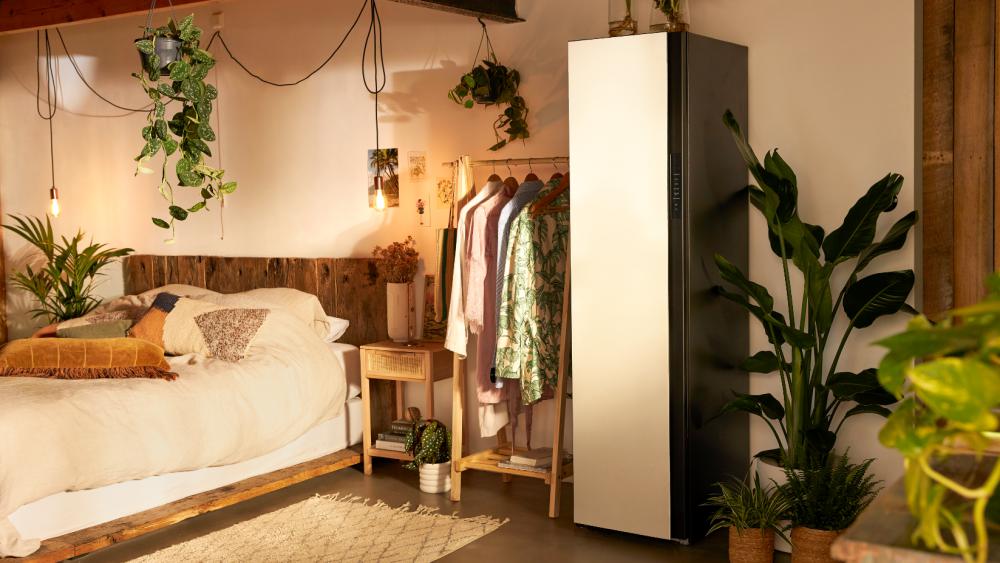The reality of the 'phantom cookers', the new enemy of the left who creates employment and helps the hostels
All the new, scares.And it seems that that is what is happening with the so -called ghost kitchens.A term that is used premeditated by certain sectors of society (leftist parties) to instill fear of the population, in this case, to the neighbors of the neighborhoods where these new establishments are located to be able to use them for political purposes.
The denomination is nothing more than a torticra translation of English, Dark Kitchen.In Spanish, it is clear that the attribute (ghost/dark/hidden) gives it a negative connotation.But, in practice, they are nothing more than satellite kitchens of a restaurant (main kitchen), which are destined exclusively to the food service at home and - so much - they carry out their activity in premises closed to the public.In view, it does not seem that the "danger" that some (PSOE or more Madrid) blame it is greater than any restaurant that offers its customers the popular delivery, or home cast.
The hospitality, touched by death by the pandemic, has found in these kitchens an escape.And, in many cases, an opportunity for survival.
"The ghost transfers an image of opacity, of not sticking to legality, when in reality it is the opposite. There is nothing to hide, they are totally functional facilities ... good for the client, for the cook and for restaurant", defends Jaime Martínez de Velasco, CEO of Cuyna.A company that works as "a network of satellite kitchens, one hundred percent focused on food at home, which, among other things - helps restaurants to expand their business."
The story of Cuyna
Deliveroo was the first company to install its support kitchens for home food service in Spain, its Deliveroo Editions, in 2018: two site of six kitchens each in Madrid (one in Atocha, to serve the southern zone,and another in Tetuán, to distribute in the north of the capital).
In January 2020, Jaime Martínez de Velasco, today CEO of Cuyna, began to turn the idea of undertaking, following this business model.
He had worked in the British food company at home, so he knew the sector and was clear about what this type of kitchens could contribute to restaurants that offer this service: many advantages.He knew the problems that many of them had to provide a good service and at home simultaneously.This new formula would allow them to expand their business in a cheap and without risk, in addition to giving them the opportunity to tantage the market before making decisions that can be crucial for their business project.
He puts as an example a restaurant in Barcelona that wants to open an establishment in Madrid.In that case, "you can try a satellite kitchen," he explains, before taking the step.For all this, the idea excited him from the beginning.He had always wanted to undertake and it was the time, he knew where the sector was heading and had the partners to do so.
At present, from Cuyna, they offer "two business models: the kitchen rental and the one we call digital franchise."The first is simple: they make available to the client a space, fully equipped.The second goes a little further: everything you need to cook is ready, you don't have to worry about anything, not even staff or logistics.
So far, they have created more than 100 job, directly or indirectly.The latter are those that generate fundamentally through the rental of their spaces, as is the case with Food Craft, a company where eight people work and develop their activity in a single satellite kitchen, although it already has two others in project.
The salvation of the hoteliers

Juan Diego Gaitán, a partner of Food Craft, found in this business model a way out of his employment situation, since with the arrival of pandemic, like many self -employed, he ran out of work.He allowed him to undertake in a short space of time and with many advantages: "Costs are reduced, the operational issue is much easier and the initial investment is much lower."
In full quarantine, he met chef Juan Beltrán."A Michelin star chef," he exclaims.He worked as head of cooking at the Heritage Hotel in Madrid, until the day the alarm state entered into force.
He tried his dishes and fell in love with his kitchen.He explained the project, and - at how much the government allowed to offer food at home - they got to work to launch their "blind kitchen."
He started operating on September 4.According to Juan Diego, they started with an initial investment of 20,000 euros, and recovered it practically in three months.As is logical, they are "very happy" and believe that this type of business implies "a brutal exit for young people who want to undertake, or for hospitality people who - unfortunately, with this situation - have had to close."They are convinced that "it can help hospitality to recover."
The goal to be demolished?
The reason for being of projects such as Cuyna is to minimize the risk assumed by the hotelier.For this reason, they have become an authentic escape route for a hardly hit sector by the economic crisis generated by the pandemic.
However, from a while to this part, they are also questioned and even beaten by some leftist formations.Through different initiatives, PSOE and more Madrid, have asked for these satellite kitchens to be paralled and expelled beyond the M-30.Something that, as the businessmen explain - would make their businesses unfeasible.
Mercedes González, current delegate of the Government in Madrid, lashed out at them when she was responsible for urbanism in the Socialist Municipal Group, considering them "a problem of the city."The day before swearing the new position of her, she anticipated that - from that position - she would continue to fight the battle.
More Madrid has demanded in the Plenary of Arganzuela "the immediate stoppage of the ghost kitchens in the courtyard between Alejandro Ferrant street, 8 and the CEIP Miguel de Unamuno (Alicante, 15)", denouncing "health problems, security, security, fumes and noise that will cause this business. "A business project that has not even seen the light yet.
These alarmist messages reach the residents of the neighborhoods in which these kitchens are located, or are in a project that are opened, generating great uncertainty that usually leads to different claiming actions through neighborhood associations, on many occasions alien to the regulationsand to the conditions in which these establishments develop (or will develop) their activity.
Once the protests are underway, there are many media that enter the game.It is easy, at a click of Google, find a multitude of headlines that demonize this business model, and the hoteliers who raise them.
Coexistence is possible
Jaime, the CEO of Cuyna, ensures that it can empathize with the feeling of some neighbors, and even recognize that some of the satellite kitchens that have been implemented in Madrid have not done everything well in their hand so as not to interfere in theneighborhood life.However, he stands out, it is not usual.
Entrepreneurs are aware that the greatest discomfort that this type of activity can present for neighbors comes from the movement of the distributors.Therefore, more and more are incorporated waiting rooms specifically designed for them, so that "they can save the motorcycle inside the facilities, and thus limit the impact of their activity in the neighborhood," says Jaime.
He is tired of hearing that his business is not legal, "because it is not true."His satellite kitchens are perfectly accepted to current regulations.
"We fulfill, that and also the regulations that comply with a normal restaurant," he explains."I can't agree that we are qualified as an industrial one, because it is not," she insists, "this is direct sale to the customer."
As for criticism for the transfer of distributors, "there are restaurants in Madrid that sell much more than a satellite kitchen," he explains.The solution is not to remove the kitchens from the capital, as PSOE or more Madrid propose."It is totally impossible, because-boundly-it is not viable. To put the kitchens outside the M-30, it is not worth making the investment."
Jaime claims to put on the skin of the residents.But he wants to make them understand that "there are many activities in the center of Madrid that require a framework of coexistence with neighbors, such as some restaurants that sell a lot at home, discos, gastronomic markets ...".
In his opinion, we must "work in this framework of coexistence, which will be given by the new regulations in which the City Council is working and in which we are participating," he adds.They are the first interested ones -he calls that "that text arrives, so that the clear rules are."
However, they have wanted to advance and have already implemented some of the new demands: filters for odors and air treatment, waiting room for distributors (rather large), rest room for chefs, etc."We have gone to maximums," he says.
On the other hand, it seems very serious what has happened in the Barcelona City Council, where "overnight" the decision has been made to make a licenses.As he warns, "he is very worrying especially for the negative impact he has on so many people who dedicate himself to this, and who live on this.""If I before talking about 50 direct and indirect works per location, in the end there are 50 families for each of them," she explains.
In addition, he points out, it is a norm "made at discretion, which affects people who have nothing to do with food at home."In Madrid, he says, "things have been done in a more harmonious way among entrepreneurs, neighbors, customers ... in a more loyal and more according to law, in my opinion."
There is no boom
The urban development area of the Madrid City Council denies that there is a "boom" of this type of kitchens in the capital.Ten licenses have been granted and only five of them are already operational.However, it should be explained that each of them corresponds to a project that can include several kitchens, in turn.
As the area delegate recalled, Mariano Fuentes, on April 14, these multi kitchens are "covered" in the General Urban Planning Plan, although he has warned that new requirements for installation are being established.Among them, "that the load and download is done inside the premises."A modification that would be scheduled before summer.
In short, urban norms are being reviewed to guarantee coexistence, after listening to the neighbors and affected companies, in two meetings.Today, the Consistory rules out the option to apply a moratorium to the granting of new licenses, as Ada Colau has done in Barcelona.
Cokukin, ahead of the regulations
The Argentine-Spanish company Cokukin, one of the most important HUB (Center of Operations) in the sector, has also advanced to the demands of the new regulations.As the saying goes, "experience is a degree", and the partners have carried out similar projects with great success in other latitudes.
According to Francisco Rey Petit, co-founder and marketing director, they have made "a Riders parking lot of more than 60 meters so they can wait for their orders, in the best conditions."The main objective is their own comfort, "that they can load their mobiles, take a soda and rest for a while."But the impact that the movement of these distributors could cause in the area is also reduced.At the same time, they are sure to have an impact on the final product that reaches the customer.
On the other hand, their smoke bells have a triple filter."The air that comes out of them is not toxic," Francisco insists.But it is more, they bonate the kitchens that promote healthy food, to minimize the smells that frying could cause."We are benefiting with a discount on the rental of all those initiatives that work with diets designed with high nutritional capacity," he says.
Also, in line with their desire for integration in the neighborhood, they have closed an agreement with the small steps "Foundation to teach the different trades of the kitchen."An initiative specially "aimed at those who want to learn and find in Cocukin a work way out."But, in addition, every two weeks they open their facilities "so that people who are interested can see" how these Dark Kitchen work, less and less dark.
Nor can we forget the positive impact of its activity on what Francisco calls "the ecosystem", generating wealth and new jobs "that had no place in traditional restoration."In their delight facilities, they directly use between 17 and 20 people.But, indirectly, this figure can be reached.









3954